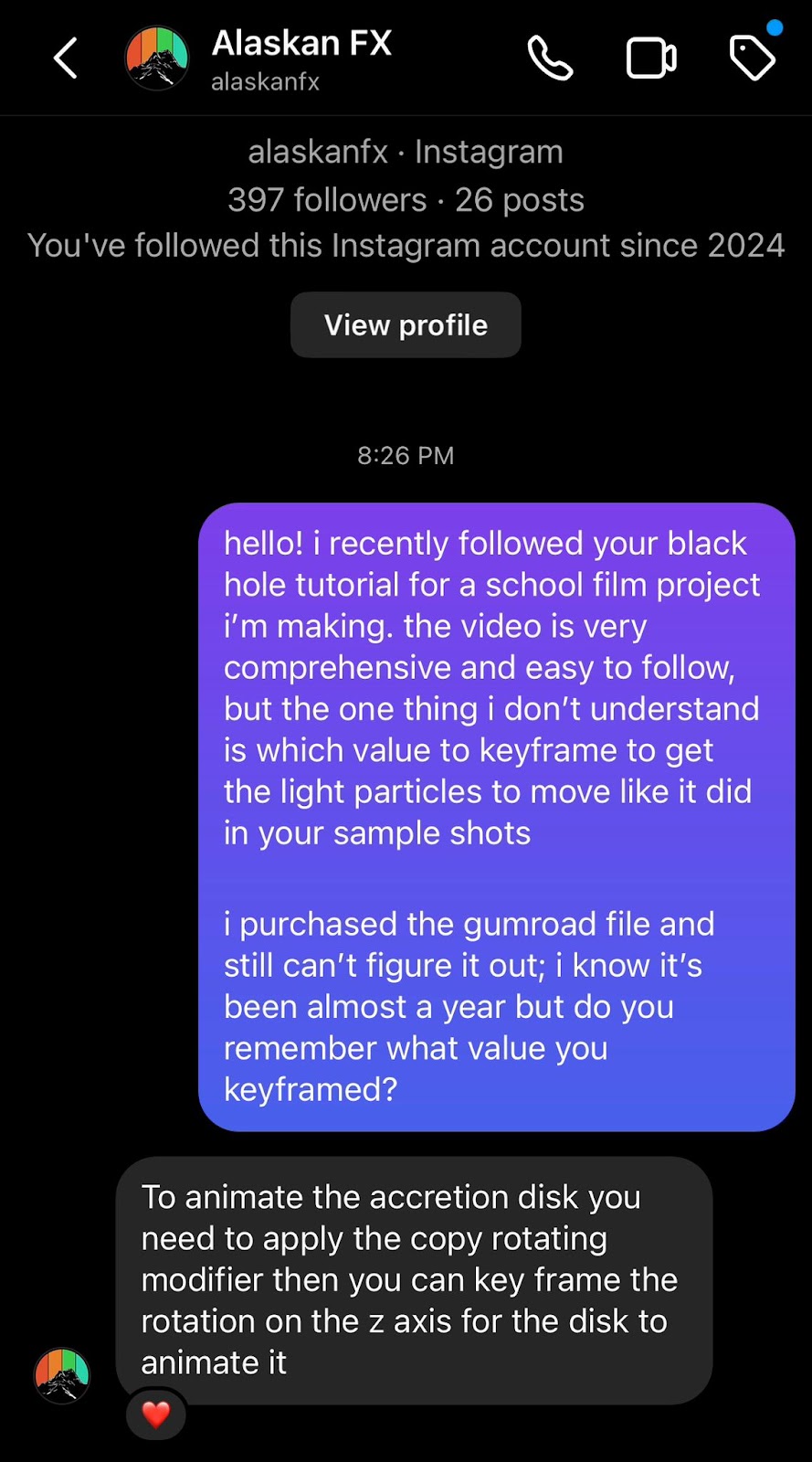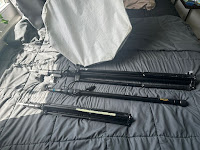This image encapsulates my new perspective on this project.
Eat your heart out, Maurice
I've been looking at a lot of stuff to help me make this project actually feasible. For example, I found a
Blender tutorial for a black hole.
This is a screenshot from fairly early on in the process. One thing I love about Blender is that it is absolutely incredible and mind-numbingly confusing.
I don't even bother trying to understand what the hell this guy is talking about, I just sit my ass down and listen.
Major props to him for comprehending this shit.
I want to add, just as a silly little side note, that I have a genuine disdain for space in every capacity. It scared the living [F-WORD] out of me as a kid, and at this point I've learned to tolerate it but I like to pretend that space isn't real. To reiterate, I am not saying I am a Flat Earther or whatever, I just hate space.
My best friend wants to be an astrophysicist.
He's not allowed near my kids.
Anyhow, this is a screenshot from a lot later in the process. I know it looks a lot better, but there's actually some issue in the node sequence for the accretion disk's float curve.
I don't actually know what any of that means, I'm just saying it so that I sound smart.
I re-did all the nodes earlier, but it still didn't work, so I think I'm just gonna delete the object and completely restart that segment of the video. Hopefully it works; if it doesn't I'm just gonna go through the rest of the tutorial and see if I can find some work-around. I'm also gonna rename it from 'disk' to 'disc' because spelling that with a 'k' feels wrong.
Update: It did not work. I am going to start over. I hate Blender.
You win this round, Brits.
Thank you Ryan Gosling
I've switched my idea completely, which means I've switched my genre completely. This is a story about a sci-fi/fantasy writer trying to find their creative spark, trying to translate the worlds they see in their mind into reality. They struggle to balance the expectations placed upon them after the success of their first book with the elements of their personal life, including platonic, familial, and romantic relationships.
Over the course of the film, reality bleeds with fiction as they rely more and more on writing as a coping mechanism, yet still they cannot seem to find satisfaction in their work. I don't exactly know where I'd go with the ending, and quite honestly I think I'd leave it open-ended, so I'm not too focused on that.
I figured that the two movies I would most want to look to for inspiration are First Man and Interstellar.
Note: Interstellar will be watched/dissected next week.
They
are both within the same genre as my piece, but I'm not really looking to understand genre conventions; truth be told, I find that intentionally formatting my film opening to fit the standards of sci-fi to be constraining.
Before I decided to even watch First Man, though, I had read its screenplay. My biggest issue with screenwriting is that I read an egregious amount of books growing up, so my writing style is more prosaic than what is considered acceptable for a screenplay.
I really liked the script; the biggest thing I noticed was that it wasn't just a one-to-one telling of what happened on the screen. It was both captivating and had the writer's voice throughout. The excerpt below really captures the essence of that voice.
Watching the movie itself, I really enjoyed their use of sub-plots to develop characters. Obviously the movie is about Neil Armstrong and the Apollo 13, but it was really interesting to see how death affected nearly everything Armstrong did; the death of his daughter, the death of his friends, the deaths of co-workers that we don't even get to see. It also plays into his home life; he grows more distant from his wife and kids as the years go by. I'm not sure how much is entirely accurate to the real Neil's life, but it adds a lot of depth to the character.
Script Excerpt
As I said, the sub-plots are very well-done; sometimes in media a sub-plot becomes a distraction from the overarching story, but in this case it serves to uplift it.
I have yet to watch
Interstellar at this point in writing (Friday), but I want to talk about another film by the same director,
Oppenheimer. Back in January I started reading the movie's script, because I wanted to get better at understanding the formatting and style of screenplays. I chose that one in particular because, after I saw
this interview, I learned that Oppenheimer, the character's, scenes were written in first person, which was apparently unheard of for a script.
One thing that they didn't mention about the script was that it also uses italics to differentiate between Strauss' perspective and Oppenheimer's.
Visually, the movie uses color to make this distinction, but I thought it was very interesting how Nolan separated the two characters in the writing itself.
I'm not sure if it's something I'll use in this script, but I feel content knowing that people do appreciate writers breaking out of traditional, monotonous formatting.
That said, this is Christopher Nolan, so I'm not sure if a writer with little reputation in film would be able to do something like that and have their film produced.
I first saw the film in theaters, and it was amazing. I'm now re-watching it with my Dad over the coming days, but I'm not sure if there's many techniques or any inspiration I particularly want to pull from it. Oppenheimer is so vast in the amount of information it covers, so a lot of times the editing feels very quick in order to cram everything in. It feels naturally paced, but once I made that connection I couldn't unsee it.
Practicality
At the time of writing this, I've yet to re-attempt the black hole; I need a mental break from Blender. I really hope that it works, because it's extremely high quality and, despite my technical issues, very comprehensive and easy to follow along. If I can't make it work then I'll have to pivot a little bit, but I'm definitely sticking with the overall story. The only thing that'll change is the story they try to tell; I'm not as into the idea, but they could be trying to write a romance novel, or generally anything more technically feasible.
I also haven't had a crack at the space station yet, and I'm not sure that, if I do end up successfully making both the black hole and the space station, I'll be able to put the two in the same Blender file so that I can just record within Blender. Worst-case scenario I record them separately at the same angle but different distances to emulate the size difference, then just make the background of the space station green so I can just chromakey it over the black hole footage.
Weekend Update: I am too busy and too tired to re-attempt that shit this weekend. That's a problem for future me.
Screenplay
Happy Sunday. We made it. I've spent the past few hours typing out my script. I've tried writing scripts before, so I have some understanding of the difficulty, but never anything like this.
Most of the time I write skits or segments for TV assignments, for example,
this. I do try to capture a specific image, but it usually just devolves into unhinged insanity.
But I wanted to take this very seriously. I wanted to translate my imagination into words to the best of my ability, and understand the different methods of doing so in a script. As I mentioned earlier, I drew inspiration from both Christopher Nolan's Oppenheimer and Josh Singer's First Man screenplays.
Reading through them, I figured that there are about five things you can use to draw attention within your script. Capitalization, italics, bold, underlines, and size.
The first four should be intuitive, but by 'size', I mean the size of each block of text.
Both authors used all of these, but in different ways. Nolan practically ruled out italics as a tool of emphasis by using it to represent perspective. He relies mainly on the other four to drive emphasis. Singer uses it for mainly two things, though. Both to create emphasis and to represent his own voice within the script.
I want to point out, I really like the First Man screenplay, but at times it's just so much.
If you showed a small Victorian child this many font styles in such a short span of time they would spontaneously combust.
I tried not to do that, but I'll admit, it does kind of come across that way. I used capitalization to emphasize details I thought were generally more important than the rest of the sentence. However, there were times when I didn't capitalize something important; this was done because I thought it threw off the pacing too much.
On that note, bold and size were primarily used for emphasis/pacing; I won't be able to read this to most people with the intonations I had in mind as I wrote, so the best thing to do is to try and capture those with boldness and sizing. You may have also noticed me doing this in my blog posts. :)
If you've read even a bit of the Oppenheimer script you can probably see just how much inspiration I drew directly from it, but I think my script's fine for a first draft. I may tweak it here or there, and maybe even add something more in case it's a little under two minutes, but it's not bad.
Last thing; it is by no means traditional, but I put the title at the very end of the screenplay. Truth be told, I do not need to pass this AICE Exam, and I am really just doing this for self-fulfillment. If not meeting industry standards gets me less points, womp womp.
If he doesn't win Best Actor I will ignite the atmosphere.
I have now re-finished
Oppenheimer. I don't want to talk about it
too much, just because this blog post is already lengthy, but it's definitely one of the best movies I've ever seen.
As I wrote earlier, I don't think there's much I want to draw from this film as a creator. However, as an actor, there is so much.
Cillian Murphy's performance is genuinely incredible. In the interview I attached earlier, everyone heaps constant praise on him, and it's so easy to see why. There's so much depth he brings to the role, and what I particularly wanted to talk about was his non-verbal performance.
Christopher Nolan said that when he saw the piercing blue eyes of J. Robert Oppenheimer staring out of the cover of American Prometheus, he thought of Cillian. Cillian's eyes do so much work in conveying Oppenheimer's mental state.
Also his body movements. There's so many scenes where his stillness works in tandem with his piercing gaze, and it just portrays sheer intelligence. It's incredible to see what dedication can reward you with, and I hope that I can develop a similar skillset, even as someone who just likes acting for fun.
Conclusion
Nuts.











































